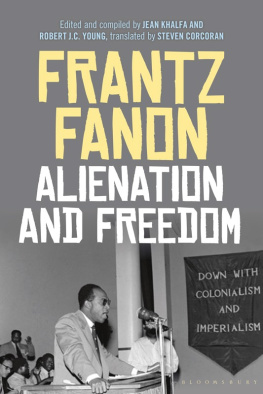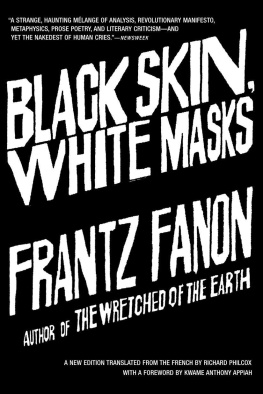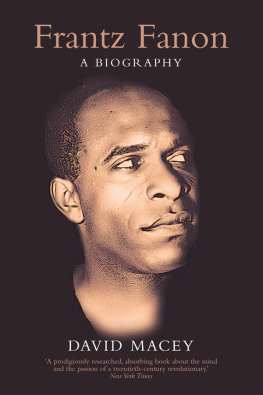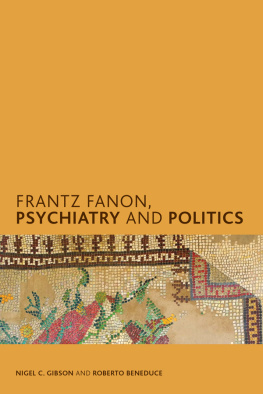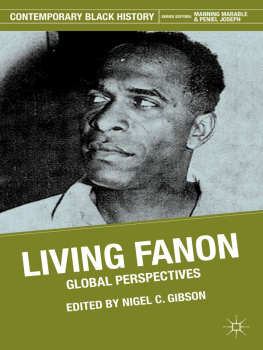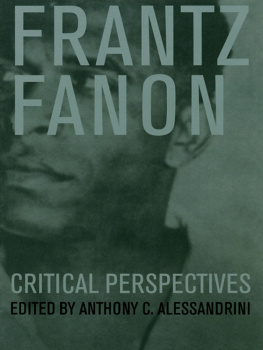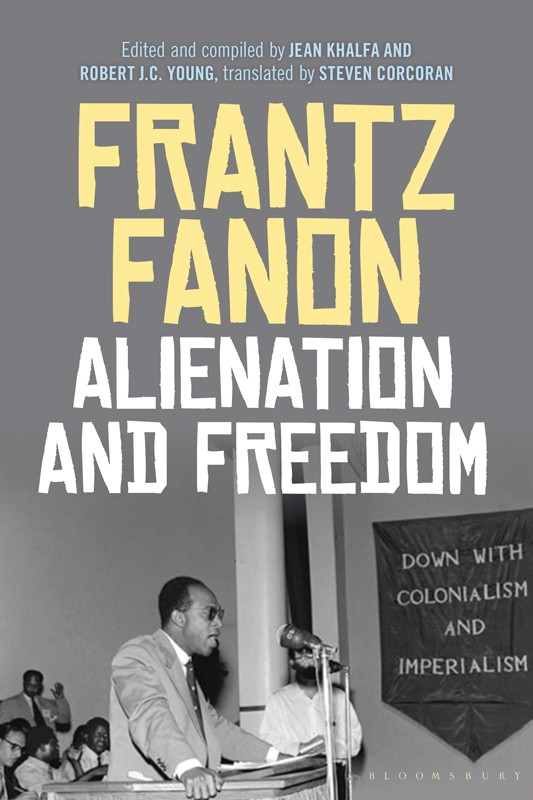
Alienation
and Freedom
This ebook belongs to Marcus Coelen (mcoelen@icloud.com), purchased on 5/1/2018
ALSO AVAILABLE FROM BLOOMSBURY
Being and Event, Alain Badiou
Dissensus, Jacques Rancire
Disparities, Slavoj iek
Edouard Glissant, Sam Coombes
How to be a Marxist in Philosophy, Louis Althusser
On Resistance, Howard Caygill
Plural Maghreb, Abdelkebir Khatibi
This ebook belongs to Marcus Coelen (mcoelen@icloud.com), purchased on 5/1/2018
Alienation
and Freedom
Frantz Fanon
Edited by Jean Khalfa and Robert J.C. Young
Translated by Steven Corcoran

This ebook belongs to Marcus Coelen (mcoelen@icloud.com), purchased on 5/1/2018
Contents
This ebook belongs to Marcus Coelen (mcoelen@icloud.com), purchased on 5/1/2018
This ebook belongs to Marcus Coelen (mcoelen@icloud.com), purchased on 5/1/2018
Part II Chapter 25
This ebook belongs to Marcus Coelen (mcoelen@icloud.com), purchased on 5/1/2018
Peau noire, masques blancs, Seuil, 1952. English translation, Black Skin, White Masks, trans. Richard Philcox, New York: Grove Press, 2008.
L An V de la rvolution algrienne, Maspero, 1959. English translation, A Dying Colonialism, trans. Haakon Chevalier, New York: Grove Press, 1965.
Les Damns de la terre, Maspero, 1961. English translation, The Wretched of the Earth, trans. Richard Philcox, New York: Grove Press, 2004.
Pour la rvolution africaine, crits politiques, Maspero, 1964. English translation, Toward the African Revolution, trans. Haakon Chevalier, New York: Grove Press, 1967.
uvres, Paris: La Dcouverte, 2011.
This ebook belongs to Marcus Coelen (mcoelen@icloud.com), purchased on 5/1/2018
JEAN KHALFA AND ROBERT J.C. YOUNG
In his 1964 preface to Pour la rvolution africaine, a posthumous collection of Frantz Fanons political texts, Franois Maspero, one of the greatest editors of his time, announced a forthcoming work:
Since becoming a psychiatrist at Blida Hospital [in Algeria], and even more so after the outbreak of the [November 1954] insurrection, Fanon also came to be a militant in the Algerian revolutionary organization. At the same time, he carried on a remarkable medical activity, innovating at many levels, deeply, viscerally close to his patients, whom he regarded as primarily victims of the system he was fighting. He collected clinical notes and developed analyses of phenomena of colonialist alienation as seen through mental illnesses. He explored local traditions and their relations to colonization. This essential material remains untouched, but it is too scattered, and we hope to be able to assemble it and present it in a separate volume.
This material on colonialist alienation as seen through mental illnesses, constitutes the heart of the present volume of Fanons texts. The reader will find in it not only Fanons dissertation in psychiatry (defended viva voce in November 1951) and the scientific articles, both single-authored and collaborative, that he published throughout the 1950s, but also manuscripts and fragments that we have discovered. We have reprinted editorial texts that were originally published in the ward newspaper of Saint-Alban Hospital, where, in 1951 and 1952, Fanon was an intern of the revolutionary psychiatrist Franois Tosquelles, and further editorials from the newspaper that he set up at Blida-Joinville Hospital (today Frantz-Fanon Hospital, Blida, Algeria), which comprised an essential element of the socialtherapy he helped to pioneer. The texts that he wrote between 1954 and 1956 were long thought to be mostly lost.
The wealth and impact of his political uvre are such that, given his short life (of only thirty-six years),
Tunisian sociologist Lilia Ben Salem has entrusted us with the notes she took of Fanons lectures on society and psychiatry at the Institut des hautes tudes in Tunis: the lectures synthesize and broaden the meaning of his works, and tell us about the books and films that excited him at the time. But leafing through the journey logbook that comprises the editorials of Saint-Alban and Blida, we already see some of the structuring themes of his thinking: vigilance as the essence of being human, a theme he presents when remarking upon the difference between wakefulness and insomnia; his constant reminders to the orderlies that he was training to inquire into the meaning of all their actions; and the distrust of institutionalization that, in his last writings, informs the critique of the neocolonial elites that emerged in many countries after winning independence.
Yet, passionate about language, poetry and theatre, Fanon was also a writer. We thus open this volume with two plays that he wrote during his medical studies in Lyon. Never before published and long thought to be lost, they throw a striking philosophical light on the texts published during his lifetime. These first texts are steeped in the poetry of Csaire and the theatre of Claudel and of Sartre. In them, however, we can also glimpse passages on the unbearable, raw light that one must risk preferring to the reassuring choice of obscurity without conflict; on the desire to accept the event as such rather than the comfort of the known, a comfort akin to death a Nietzschean conception of the tragic that informed his political thinking on disalienation and independence. In Sartre, the thinker he probably admired most, he had already discerned the thought of the present that would be developed in Critique de la raison dialectique, about which he later gave seminars to officers of the Algerian National Liberation Army.
After theatre and psychiatry, we come to his political reflection. In the third part, we reprint a certain number of articles originally published in El Moudjahid from 1958 on. These texts were not used in Pour la rvolution Along with a previously untranslated speech justifying the FLN use of violence, the reader will also find here two previously unpublished texts dealing with important issues: a propaganda pamphlet published in Accra, Ghana, where Fanon was the ambassador of the Provisional government of the Algerian Republic the pamphlet develops an acerbic critique of some new African elites, whom he calls stooges of imperialism, and of neocolonialism more generally; and, in a letter to Iranian philosopher Ali Shariati, kindly provided to us by Mrs Sara Shariati, we find his reflections and doubts on the role of religion in a revolutionary process. However, much of Fanons political correspondence remains undiscovered.
We have consulted the family library and provide a list of the works from the collection that most probably belonged to Fanon himself, reiterating his marks and annotations whenever significant.
Finding and assembling these texts was not a simple process. In this task, Fanons Italian editors, Giovanni Pirelli and Giulio Einaudi, of course preceded us, as did Franois Maspero, who drew up the first inventory of Fanons writings. The essential part of the correspondence containing this inventory is presented in the fourth part of this volume titled Publishing Fanon. Retracing the work of these pioneers, who radicalized publishing with a view to creating a new society, we saw that texts that we now take as fixed works Fanon viewed as elements of rather shifting arrangements. Their plans to publish Fanons complete works, which they arranged in a somewhat different fashion from what we consider today as the Fanon corpus, nevertheless did not come about. For over a decade now, we have sought to tackle this corpus anew.
Next page
